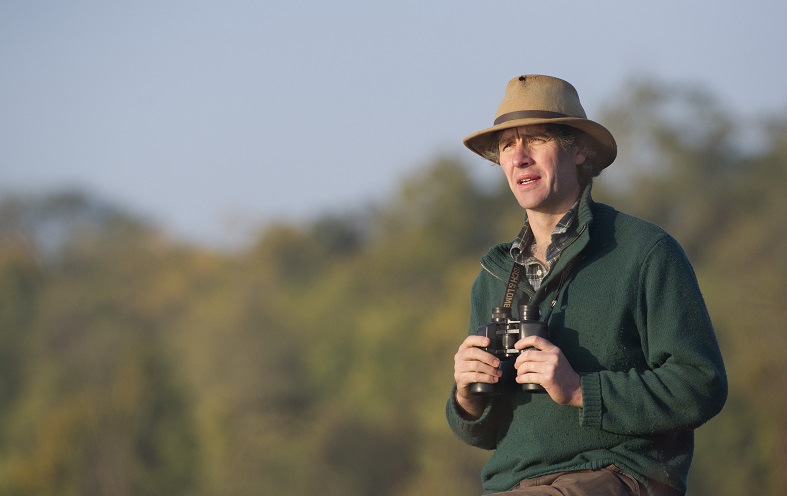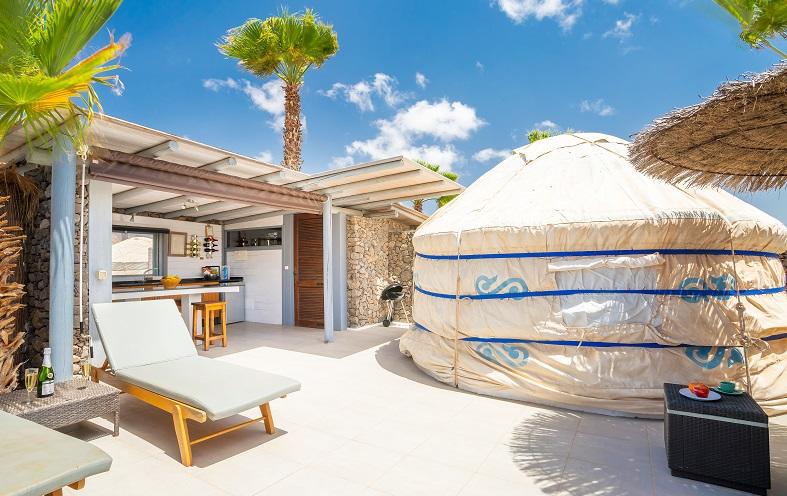
How can communities living in one of the remotest parts of the planet with minimal resources and extreme weather conditions enjoy a sustainable living?
Ecosphere, a social enterprise co-founded by Ishita Khanna, has been relentlessly working for over two decades towards empowering villagers and creating sustainable livelihoods in the mountainous Spiti Valley in Himachal Pradesh, India. In our interview, Ishita shares how her organization is supporting sustainable regional development, through initiatives such as building greenhouses to grow their own vegetables, setting up homestays to help generate extra income from travellers, constructing check-dams for sufficient water during summers, reviving traditional arts and crafts and selling these products to visitors.
Ecosphere encourages experiential travellers to volunteer where they can enjoy the scenic Himalayan landscape while engaging themselves in schooling village kids, managing the on-site cafe, building greenhouses, solar cookers, or check-dams.
Ishita, you started your career in sustainability and development at the Tata Institute of Social Sciences – How has your education and experience in social work impacted your approach to sustainable tourism? And how did it lead to Spiti?
While studying at the Tata Institute of Social Sciences, I undertook a thesis on the impact of tourism on the socio-cultural, economic, and ecological environment of a destination. The fieldwork associated with the thesis brought to light the negative impact which tourism can have on a destination. It helped me to understand how these negative impacts could be minimised or averted. This was the foundation for the work that I later started in Spiti.
Does your current view of sustainability and tourism differ compared to the one you had when you graduated?
My view of tourism and sustainability has definitely grown from the time I graduated. Academics often flow in the space of idealism, but ideal situations rarely exist on the ground. It has been a huge learning curve for me to live in one of the remotest and hardest parts of the world, working on a multitude of issues that come into play in shaping sustainability.
Ecosphere works on a broad spectrum of topics, such as:
- helping communities build resilience to climate change
- enabling year-round access to water and nutrition
- carbon reduction and harnessing the abundantly available solar energy
- reducing, recycling and upcycling waste
- enhancing health care access, diagnosis, and treatment
- enabling access to education for girls
- helping to build community entrepreneurship, additional livelihoods
- most importantly: supporting and kindling the growth of compassion amongst communities.
Considering that fifteen years ago Spiti was not even found on any of the mountain tourism itineraries, Ecosphere has been instrumental in putting the valley on the map. How did you achieve this?
There are multiple factors that have put Spiti onto the global map and, most prominently, social media in the last five years.
The starkly beautiful locale of Spiti with breathtaking views of the mountains, interesting trekking trails, magnificent night sky, diverse flora and fauna, rich cultural heritage and fascinating folklore are some of the many reasons why Spiti has gained popularity around the world.
It is also aptly referred to as the ‘Valley of Monasteries’. Some of the oldest Buddhist monasteries and temples dating back more than 1000 years, along with unique aspects of Tibetan Buddhist culture are well preserved and have flourished in the Spiti Valley.
How has Ecosphere been able to prevent any erosion of local heritage with the increased number of visitors?
From the inception of our tourism initiatives in the region, we realised the ease with which local heritage is destroyed to make way for modernism, often brought on not just by tourism but a multitude of factors. To address this, we decided to try and make tourism a tool to conserve it.
Local families were encouraged and awareness created on the concept of homestays. This was done both to create an alternate and equitable source of income for local communities, but also as a means to conserve the local mud architectural building styles of the region, which were under threat by the mushrooming of concrete guesthouses. Local arts and crafts were similarily incorporated into the fold of tourism, enabling a source of income for the artisans and an incentive to continue practising their craft forms, thereby enabling their conservation.
Every destination faces the risk of overtourism. Spiti, too, is at a cross-roads right now and measures will need to be taken soon by the community to create a balance between economics and ecology on which the tourism industry thrives.
What are the market opportunities Ecosphere can exploit to increase its competitiveness as an ecotourism destination?
We believe collaborations are the way forward: with like-minded organisations or individuals keen to make a greater impact, combined with greater overall market outreach.
‘Authenticity’ in destinations is nowadays a key expectation of modern travellers. In your experience, is the market now more engaged and interested in the sustainable livelihoods approach offered by Ecosphere?
We have noticed an increase in the experiential traveller, keen on meaningful experiences, and making a difference. Such travellers are keen on understanding and experiencing local life, or even volunteering while they travel.
For us, this is positive in every regard, as such travellers are more sensitive about how they travel and about their impact while they travel. They are more inclined to travel responsibly and are on the lookout on how their travel can make a difference.
As a social enterprise working to build sustainable local economies, we have been able to integrate various livelihood opportunities for local communities thanks to such mindful travellers. Moreover, through varied volunteering opportunities, we have been able to link travellers to the developmental needs of Spiti as well, matching their skills and interests with these needs.
Which issues does a responsible travel business like Ecosphere struggle most with?
Being a responsible travel business, we believe in paying our partners and employees fairly and ploughing back revenues towards various projects that work on addressing developmental needs and challenges in the region.
However, this gets difficult when regular tour operators try and copy the ideas and philosophy without putting them into action in their practices. So, while they may appear to be offering a similar product with a similar philosophy, in reality their on-ground practices are far from responsible or social.
To link nature conservation, culture preservation, income generation, and gender empowerment is a very ambitious set of goals and yet, Ecosphere has found a way to do exactly that. Which of the many projects during your work with Ecosphere have you personally found the most rewarding?
Our homestay program in Demul, a village on the highlands of Spiti Valley at 4,300 metres above sea level, has been the most rewarding for me – both personally and professionally. The homestays in Demul were started by Ecosphere in 2004 as a means to create alternate income for an otherwise agriculture-dependent community.
A six-month-long cold winter with temperatures dipping to as low as –30ºC, leaves the village community with an extremely short working season to earn the year’s livelihood. Agriculture, which is limited to one crop a year, is solely dependent on the winter snow for irrigation. This leaves the village community highly susceptible to slight changes in climate, which are increasingly becoming the norm.
Demul has approximately 55 households, of which over 48 operate as homestays. The spare room in these households was done up and converted into the homestay room. Hence, while in a Demul homestay, one is staying with the local family which makes the whole experience authentic.
Set across the beautiful trans-Himalayan meadows of Spiti, the Demul village homestays follow a unique rotation model to ensure even distribution of guests and the associated financial benefits across the village. The homestays are modeled on traditional patterns of village governance that favour cooperation over competition.
Every year, two village coordinators are appointed by the village, who allocate the guests to homestays on a rotational basis, ensuring equitable benefits between all homestays.
The Demul Homestays require minimal investment, providing an equal opportunity to both the rich and poor to get involved in tourism-related activities. The rotational system maintains equal benefits to the rich and poor. At the end of the year, the money is distributed equally amongst all the homestays and directly into the hands of the women. With over 1500 room nights annually, homestays in Demul are able to earn up to INR 40,000 (~USD 530) in a short span of 3 to 4 months, which is equivalent to an average 50% of their annual income.
Which aspects of developing a destination like Demul sustainably do you find especially important?
The advent of tourism often changes the traditional architectural integrity of a place, replacing them with concrete guesthouses often modeled on architectural styles in complete contrast to the local architecture, creating real eyesores.
One of the objectives behind the homestays in Spiti valley was also to maintain the architectural integrity of the villages, along with conserving the local architectural styles.
Along with the homestays, a host of activities and day trips have been developed, providing deeper insight for travellers into local culture and way of life, enriching their experience while encouraging travellers to stay longer. And on the other hand enabling conservation of art forms and traditional knowledge.
With changing times, often traditional culture and crafts undergo a change and witness a slow death. In Demul however, to address the concern for dying crafts, activities that showcase and involve learning of traditional arts and crafts have been developed, such as yak rope spinning.
Making yak rope was an activity that the men in the village would do. However, the younger generation was not keen on taking it forward. Travellers can now learn the art of spinning yak wool into a rope, which encourages the younger generation of men at the village to learn the skill in order to teach it to travellers.
On similar lines, the younger generation is not learning the numerous traditional songs and dances. With the help of Ecosphere, the elders in the village have trained the youth, who are now actively showcasing this to travellers who come and stay in village homestays.
Demul village also houses one of Spiti’s more well-known practitioners of traditional medicine, which visitors can experience in a day trip developed to enable both an immersive and learning experience for travellers and an incentive for the Amchi (local doctor) to continue passing this rich tradition to the younger generations.
The homestays have also provided a much-needed outlet for the women in the village to showcase and sell their traditional crafts. This is providing an additional source of income for women, from tourism.
Volunteering opportunities have also been developed which are not only helping the local community but are a great experience for travellers and a way to learn traditional systems of living and farming of Spiti. While staying with a family, travellers can choose to join them in the fields, herd their livestock, prepare meals, help with their children’s homework, learn the local dialect or just immerse themselves in Spitian culture. Volunteers have also helped restore 300-year-old village stupas, fix drains, collect garbage and build an artificial glacier for the village.
While the homestays are just one program, we have found that they lead to a multitude of benefits for the local community, culture, and environment. Not just income but also a sense of pride amongst the community for their culture, heritage, way of life, traditional architecture, arts, and crafts enabling their conservation and further development.
We have also noticed that the community becomes more conscious of personal and village hygiene and cleanliness, helping villagers to take initiatives around garbage management and cleanliness drives.
With travellers keen on wildlife coming and staying in their homestays, the community has developed value and appreciation for the wildlife as well, which were earlier looked upon as predators or a nuisance. Cases of human-wildlife conflict were not uncommon earlier, which have now totally stopped. In fact, the community not long ago rescued and freed a snow leopard that had gotten stuck in a livestock pen, after killing numerous herds of livestock.
Which lessons or key insights from the entire sustainable development project of Ecosphere might serve other tourist destinations around the world?
We have found that it is crucial while working in destinations, especially when it involves local communities, that a holistic approach be adopted: one that reduces dependence and builds resilience. While developing tourism as a livelihood option in communities, it is therefore equally crucial that this is combined with developing other livelihood streams as well.
In Spiti, our endeavour from the start was to build tourism as an alternate livelihood option, while simultaneously strengthening and building other livelihood options as well, so that if there is a bad year for one, then the other can supplement.
Mostly till now, tourism was providing a much needed alternate income stream for communities during tough agricultural years, and now in the times of COVID when all tourism is at a standstill, communities in Spiti, fortunately, have a safety net to fall back on.
Thank you, Ishita.
Connect with Ishita Khanna on LinkedIn. Find out more about Ecosphere’s ecotravel initiatives and volunteering opportunities here.
Enjoyed our interview with Ishita Khanna on her commitment to turn around the livelihoods of remote communities through empowerment, responsible travel, and sustainable destination development? Thanks for sharing!











